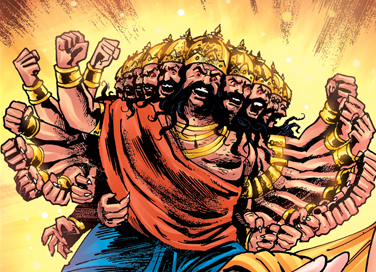Lord Rama is loved and worshipped for being an intensely benevolent and dutiful prince and, later, king. His kindness towards his devotees and followers and his unshakeable sense of dharma, his duty, towards his parents and family, makes him the personification of the perfect man.
For all his inherent kindness and his merciful nature, Rama was a frightening force on the battlefield. Ravana was the asura king of Lanka, bestowed with a boon from Lord Brahma and gifted with an invincible sword by Lord Shiva himself. Yet, as he watched Rama fight tirelessly with preternatural skill and precision, steadily depleting his army of asuras, Ravana is said to have realised, with an odd certainty, that although Rama was a mere mortal, he was about to meet his end at Rama’s hand.

Whoever Ravana sent into battle with Rama never came back; whether it was Ravana’s eldest son, Indrajit, blessed with incredible powers of sorcery and warfare, who met his end at Lakshmana’s hands, or Ravana’s brother, Kumbhakarana, the giant, who met his end at Rama’s hands. Ravana quickly deduced that Rama was a terrifying force to be reckoned with. It is said that as Ravana donned his armour to go into battle with Rama at last, he knew he wouldn’t come out alive either.
The battle between Ravana and Rama was witnessed by the gods themselves. Indra, the king of the gods, sent his chariot along with his charioteer, Maatali, down to serve as Rama’s battleship. When Ravana’s enchanted chariot took to the skies, so did Rama’s and that was when Ravana knew that the gods were rooting for, and actively supporting, Rama. He was infuriated.
Ravana shot shower after shower of arrows at Rama, covering the skies with them, but Rama calmly and methodically countered Ravana’s attack, neutralising his tactics effortlessly. Ravana, losing patience and panicking, resorted to using asthras: supernatural weapons. Creating illusions with the help of these weapons, Ravana ignored the rules of fair warfare in favour of using sorcery (manipulating the weather, and then playing with Rama’s own perception). To Ravana’s intense dismay, Rama countered all of his vicious tactics, using mantras against the asura king’s volleys.
At one point during the battle, when Rama had begun cutting Ravana’s heads off one at a time, Ravana fainted. Rama with his unshakeable sense of what is right and fair, stopped attacking at once. It was after Ravana regained consciousness and was informed by his charioteer of Rama’s upright sense of honour that Ravana threw all of his remaining strength into his final attack. This time, Rama used an asthra of his own to attack Ravana, finally bringing the asura down for good.
As Ravana’s lifeless form descended, it is said that his face was devoid of cruelty or wickedness, and was instead calm and devout, as though he were meditating. Rama, Lakshmana and Hanuman gathered around Ravana’s body, and Rama instructed Vibhishana, Ravana’s brother, to see to Ravana’s final rites with solemn honour.
Read more Amar Chitra Katha stories about Ramayana





